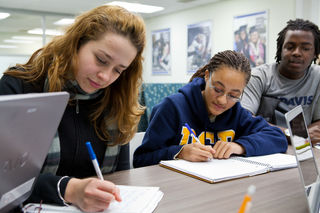Education
Innovative Ways to Help First-Generation Students Thrive
Three interventions showcase approaches to help first-gens succeed in college.
Posted August 6, 2018

With the start of classes fast approaching, many colleges expect to see more first-generation students on campus than ever before. Nearly a third of students attending four-year universities are now first generation, with even higher numbers at community colleges. But it has been well documented that first-gens tend to lag behind their continuing-generation peers whose parent(s) earned a college degree. Nationwide, first-gens graduate at a rate 14 percentage points lower than continuing-generation students, earn lower GPAs, accumulate credits at a slower pace, and feel more isolated in college. We know that closing these gaps is critical to fulfilling higher education’s mission to alleviate economic inequality and interrupt intergenerational poverty, so it’s no wonder that colleges across the country have designed supports specifically to address the unique needs of first-gens, such as Ohio University’s First Scholars, Cornell’s First-in-Class Program, and the University of Washington Tacoma's "We Are First Generation". And first-gens are building their own communities and advocating for themselves through initiatives like I’m First.
But why do first-gens struggle in the first place, and how can we help these students before they fall behind? I want to share three recent interventions that were: 1) Grounded in psychological theory; 2) Rigorously tested, and; 3) Successful in helping first-gens transition to college. Each intervention had a unique structure and focused on different challenges facing first-gens, but all three were able to motivate first-gens to ask for help and ultimately improve their academic outcomes.
Challenging the Deficit Model
Given what we know about first-gens’ challenges, coupled with our desire to help these students thrive, it can be all too easy to inadvertently signal that first-gens don’t belong in college. The mere fact that colleges provide additional support, if handled insensitively, can backfire by making first-gens feel coddled and incapable of success. This first intervention sought to reverse the narrative about first-gens by reframing their life experience not as a burden to bear, but as a strength that can carry them through college.
Sixty-six incoming first-gens attended a panel in which they heard juniors and seniors tell their stories of transitioning to college. Some of these first-gens experienced difference education: the panelists talked about how where they came from influenced their college experience in both good and bad ways. For example, a first-gen panelist mentioned how they couldn’t rely on their parents for advice about college, but that this void ultimately strengthened their relationship with their advisor. First-gens, therefore, heard from older peers why being first-gen can be a good thing. In the control condition, first-gens heard similar stories but without knowledge of each panelist’s background. The researchers found that first-gens who underwent difference education were significantly more likely to seek help resources on campus (e.g., meeting with professors). In turn, those students who sought more resources had a significantly higher GPA at the end of their first year of college.
Bolstering Academic Skills and Mindsets
Another reason why first-gens struggle is because they tend to be less academically prepared, which (beyond content knowledge) can manifest as insufficient study and time management skills, counterproductive attitudes toward schoolwork, or not knowing the subtle norms of college such as how to engage with faculty. The Skills Learning Support Program (SLSP) sought to address these barriers directly through specialized classroom instruction. SLSP enrolled 137 incoming students from economically disadvantaged backgrounds (mostly first-gens) who were admitted to college despite substandard credentials (e.g., low standardized test scores). SLSP consisted of an intensive, 6-week summer program followed by additional college skills courses taken during the academic year. In a pre-post design, they found that students who took SLSP were:
- More willing to seek help when facing obstacles
- More motivated to succeed in college
- Leveraging more effective learning strategies
- Better at time management
- More driven by mastery goals (i.e., learning something for the sake of learning it) than by performance goals (i.e., wanting to earn a good grade)
Even more impressive, by the end of the first year students in SLSP had significantly higher grades than students who were admitted to the college under the normal standards. This GPA advantage persisted until their fourth year. And although not statistically significant, students in SLSP were almost 20% more likely to graduate within four years (50% v 42%) than their peers.
Building Social Capital
Social capital refers to the support one receives through relationships with other people. A third way of thinking about first-gens’ challenges is that they tend to matriculate with less social capital than their peers, and are often less prepared to cultivate social capital once they arrive on campus. As we’ve seen in the prior interventions, bolstering first-gens’ willingness to and confidence in asking for help seems to be an important part of their transition to college, and doing so may help tap into this idea of social capital. This intervention sought to teach first-gens about the importance of social capital and foster the skills necessary to build and leverage that resource.
The Connected Scholars Program (CSP) was originally piloted with 12 college-bound high school seniors. CSP comprised eight sessions focused on the importance of mentorship, identifying and connecting with mentors, and finding support during the transition to college. This pilot was then scaled up to 140 first-gens attending a college summer bridge program, but scaled back to only four sessions due to time constraints. Compared to first-gens from the prior academic year, students in CSP reported better relations with their instructors, a stronger belief in the value of support, and a higher willingness to ask for help. Most importantly, these first-gens had a significantly higher GPA at the end of their first year compared to the prior year’s students.
Interventions for First-Generation Students
We know that first-gens don’t always matriculate with the social and non-cognitive tools they need to thrive in college, but these interventions highlight the opportunity that colleges have to help first-gens catch up to their peers. Each of these interventions takes a different perspective on helping first-gens, but there are important similarities to consider when thinking about how you can best serve first-gens at your institution.
1. All three sought to foster new skills and mindsets so that first-gens are set up to succeed well after the intervention has ceased. This approach aligns with the idea of wise interventions: by changing the underlying psychology behind students’ behavior you can produce meaningful, long-term effects. With impact on academic performance still observed through first-gens’ third year of college, the utility of this approach is evident.
2. All three found first-gens’ willingness to seek help to be a crucial predictor of success. Not only might first-gens be more in need of help than their peers, but often their backgrounds and experiences make them the most reticent to ask. First-gens will be most likely to close the gap between themselves and their peers when they’re comfortable seeking out support by their own initiative.
3. All three interventions took care not to make first-generation students feel less than their peers. Only when students feel supported—not coddled—and come away with the notion that their college believes in them can these interventions produce the desired effects.
References
Schwartz, S. E. O., Kanchewa, S. S., Rhodes, J. E., Cutler, E., & Cunningham, J. L. (2016). “I didn’t know you could just ask:” Empowering underrepresented college-bound students to recruit academic and career mentors. Children and Youth Services Review, 64, 51-59.
Schwartz, S. E. O., Kanchewa, S. S., Rhodes, J. E., Gowdy, G., Stark, A. M….Spencer, R. (2018). “I’m having a little struggle with this, can you help me out?”: Examining impacts and processes of a social capital intervention for first-generation college students. American Journal of Community Psychology, 61, 166-178.
Stephens, N. M., Hamedani, M. G., & Destin, M. (2014). Closing the social-class achievement gap: A difference-education intervention improves first-generation students’ academic performance and all students’ college transition. Psychological Science, 25, 943-953.
Wibrowski, C. R., Matthews, W. K., & Kitsantas, A. (2016). The role of a skills learning support program on first-generation college students’ self-regulation, motivation, and academic achievement: A longitudinal study. Journal of College Student Retention: Research, Theory & Practice, 19, 317-332.




